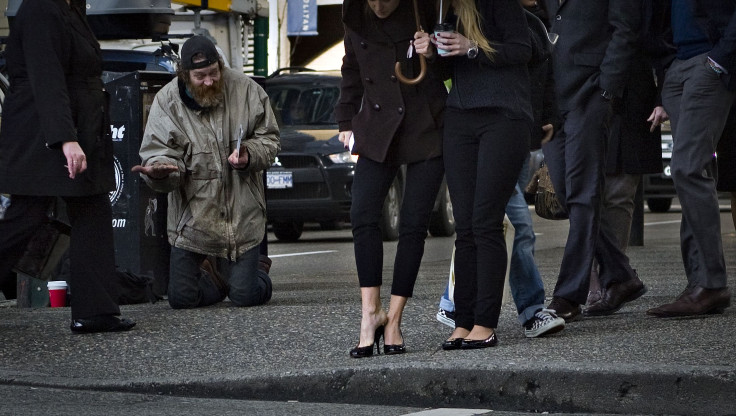For One Group Of Activists The Solution To Canada's Poverty Is 20,000 Canadian Dollars A Year For Everyone

Should citizens be guaranteed an annual minimum income regardless of employment status?
For the most part this question has been answered by the world’s largest capitalist democracies. Even countries offering the most generous social welfare programs, such as free child care, monthly stipends for the unemployed and single-payer health care system, don’t offer a guaranteed annual allowance like the one called for this past weekend by a group of Canadian anti-poverty activists.
“For many of us, we think the goal is no one should be living in poverty,” Rob Rainer, a campaign director for the Canadian affiliate of the Basic Income Earth Network, said at an anti-poverty conference in Montreal this weekend, according to the Globe and Mail. “That’s essentially what we’re striving to achieve.”
Ranier’s group is calling for a guaranteed minimum annual salary of 20,000 Canadian dollars, or about $18,700, as a way to tackle income inequality. While Canada’s middle class is now the world’s most affluent, having recently surpassed the United States, the country lags behind developed nations in child poverty and about 900,000 of the country’s 34 million people visit food banks every month. The country grapples with an enduring wealth problem among its indigenous population, too, with about half of First Nations children living in poverty.
Proponents of the plan argue that a guaranteed minimum annual salary would offset other welfare costs, and the argument has precedents on both sides of the U.S.-Canada border. In the mid-1970s the Canadian government tested a $17-million pilot to give poor families in the town of Dauphine, Manitoba, guaranteed minimum annual incomes. Researchers found that overall health improved – poverty has been linked to poor health – which meant lower public health costs to the town’s residents.
"We found that, overall, hospitalizations in Dauphin declined relative to the control group," Evelyn Forget, professor of community health science at the University of Manitoba, told CBC in 2010. "We also looked at accidents and injuries, and they also declined. You can argue that accident and injury hospitalizations are strongly related to poverty."
Despite the research, political support waned in the late 70s and the pilot program was scrapped. In 1969, Republican President Richard Nixon called for a similar program in the United States. Called the Family Assistance Plan, or FAP, the program (pdf) was aimed at providing at least $1,600 ($10,121 in 2013 dollars) to poor families of four.
The proposal passed the House of Representatives but stalled in the Senate, largely because Democrats wanted a more comprehensive social welfare program.
© Copyright IBTimes 2024. All rights reserved.






















